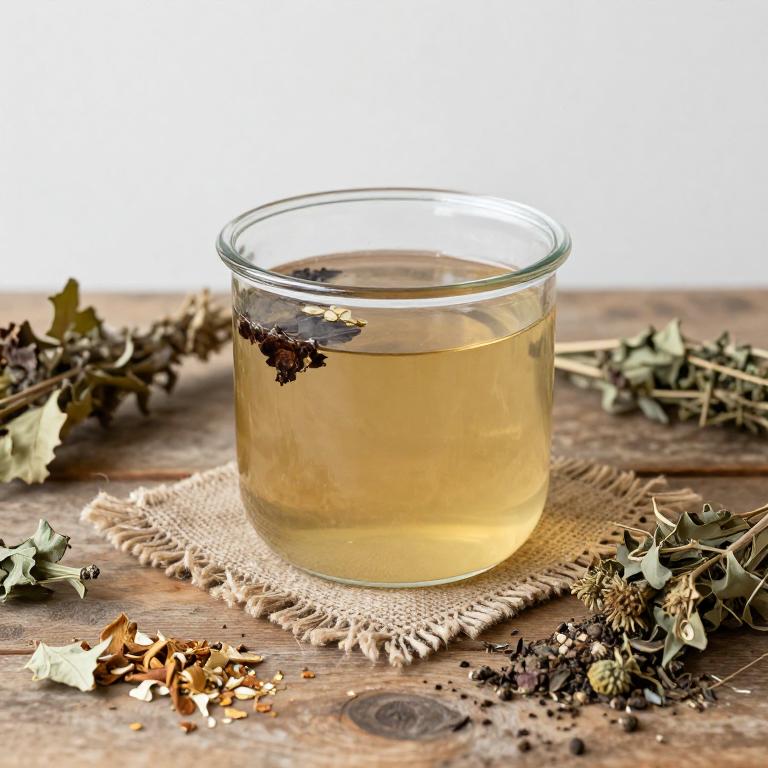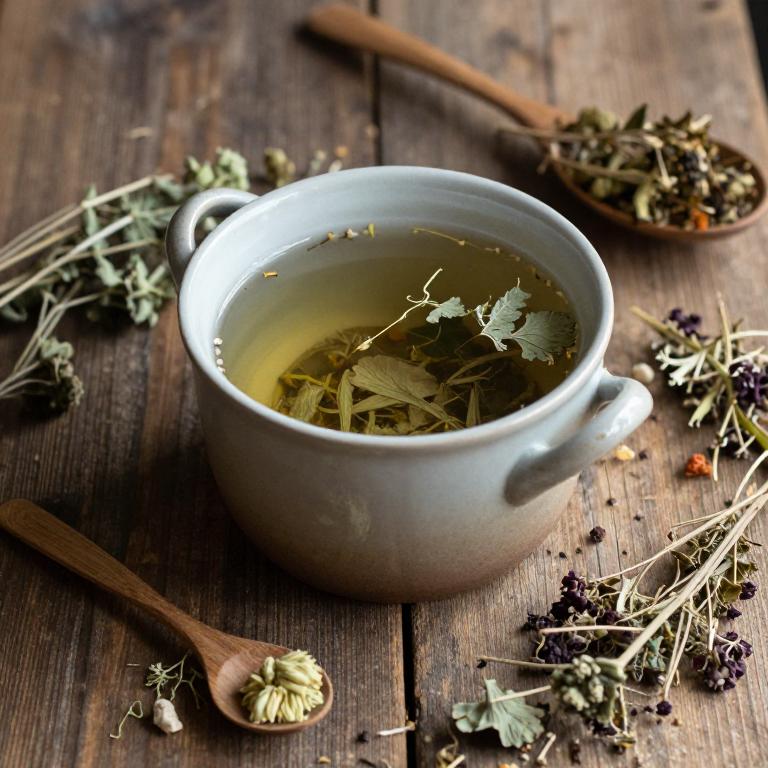10 Best Herbal Decoctions For Vomiting

Herbal decoctions have been traditionally used to alleviate vomiting by harnessing the therapeutic properties of various plants.
Commonly used herbs include ginger, peppermint, and licorice root, which are known for their anti-emetic and soothing effects on the gastrointestinal tract. To prepare a decoction, herbs are typically simmered in water for an extended period to extract their active compounds. This method allows for the gradual release of bioactive substances that can help reduce nausea and calm stomach activity.
Herbal decoctions are often preferred for their natural composition and can be customized based on individual health needs and symptoms.
Table of Contents
- 1. Ginger (Zingiber officinale)
- 2. Cumin (Cuminum cyminum)
- 3. Black pepper (Piper nigrum)
- 4. Fennel (Foeniculum vulgare)
- 5. Ceylon cinnamon (Cinnamomum verum)
- 6. Turmeric (Curcuma longa)
- 7. Thistle (Silybum marianum)
- 8. Boneset (Eupatorium perfoliatum)
- 9. Dill (Anethum graveolens)
- 10. Peppermint (Mentha piperita)
1. Ginger (Zingiber officinale)

Zingiber officinale, commonly known as ginger, has been widely used in traditional medicine for its anti-emetic properties.
Herbal decoctions made from fresh or dried ginger root are often prepared by boiling the rhizome in water to extract its active compounds, such as gingerol and shogaol. These decoctions are traditionally used to alleviate nausea and vomiting, particularly in cases of motion sickness, morning sickness during pregnancy, or gastrointestinal upset. The warming and soothing effects of ginger help to calm the digestive system and reduce stomach irritation.
Clinical studies have supported the efficacy of ginger in reducing vomiting symptoms, making it a popular natural remedy for digestive discomfort.
2. Cumin (Cuminum cyminum)

Cuminum cyminum, commonly known as cumin, has been traditionally used in herbal medicine for its digestive properties, including its potential to alleviate vomiting.
The preparation of a cumin herbal decoction typically involves boiling the seeds in water to extract their essential oils and active compounds. This decoction is believed to help soothe the stomach and reduce nausea by stimulating digestive enzymes and improving gut motility. In various cultural practices, cumin decoctions are often consumed before meals or as a remedy for motion sickness and morning sickness.
However, while anecdotal evidence supports its use, further scientific research is needed to fully establish its efficacy and safety for treating vomiting.
3. Black pepper (Piper nigrum)

Piper nigrum, commonly known as black pepper, has been traditionally used in herbal medicine for its potential anti-emetic properties.
Herbal decoctions made from black pepper are believed to help alleviate symptoms of vomiting by stimulating digestion and reducing gastrointestinal discomfort. The active compound, piperine, may enhance the absorption of other nutrients and support digestive health. However, while some anecdotal evidence suggests its efficacy, more scientific research is needed to confirm its effectiveness for treating vomiting.
As with any herbal remedy, it is advisable to consult a healthcare professional before use, especially for persistent or severe cases of vomiting.
4. Fennel (Foeniculum vulgare)

Foeniculum vulgare, commonly known as fennel, has been traditionally used in herbal medicine for its digestive properties, including its potential to alleviate vomiting.
A decoction of fennel seeds is often prepared by simmering the dried seeds in water for several minutes to extract their active compounds. This preparation is believed to help soothe the stomach and reduce nausea by stimulating the production of digestive enzymes. The essential oils in fennel, particularly anethol, are thought to have antispasmodic and carminative effects that may ease gastrointestinal discomfort.
While fennel decoctions are generally considered safe in moderate amounts, it is advisable to consult a healthcare professional before use, especially for prolonged or severe cases of vomiting.
5. Ceylon cinnamon (Cinnamomum verum)

Cinnamomum verum, commonly known as true cinnamon, has been traditionally used in herbal medicine for its warming and digestive properties.
Herbal decoctions made from the bark of Cinnamomum verum are often prepared by simmering the dried bark in water for an extended period to extract its active compounds. These decoctions are believed to help alleviate symptoms of vomiting by soothing the digestive tract and reducing nausea. However, while some traditional practices suggest its use for gastrointestinal discomfort, scientific evidence supporting its efficacy for vomiting is limited.
It is important to consult a healthcare professional before using cinnamon decoctions, especially for persistent or severe vomiting, to ensure safety and appropriateness.
6. Turmeric (Curcuma longa)

Curcuma longa, commonly known as turmeric, has been traditionally used in herbal medicine for its anti-inflammatory and digestive properties.
Herbal decoctions made from Curcuma longa roots are often prepared by boiling the dried rhizomes in water to extract their active compounds, such as curcumin. These decoctions are believed to help alleviate symptoms of vomiting by soothing the stomach lining and reducing gastrointestinal inflammation. The antimicrobial properties of curcumin may also help in eliminating harmful pathogens that contribute to nausea and vomiting.
However, while some studies suggest potential benefits, more research is needed to fully understand its efficacy and safety in treating vomiting.
7. Thistle (Silybum marianum)

Silybum marianum, also known as milk thistle, has been traditionally used in herbal medicine for its potential hepatoprotective properties.
While it is commonly studied for liver health, some preliminary research suggests that its herbal decoctions may have antiemetic effects, helping to alleviate symptoms of vomiting. The active compound, silymarin, is believed to contribute to these effects by reducing inflammation and protecting gastrointestinal tissues. However, more clinical studies are needed to confirm its efficacy in treating vomiting specifically.
Despite its traditional use, it is important to consult a healthcare professional before using milk thistle, especially for individuals with existing medical conditions or those taking other medications.
8. Boneset (Eupatorium perfoliatum)

Eupatorium perfoliatum, commonly known as boneset, has been traditionally used in herbal medicine for its potential digestive benefits.
A decoction made from the dried leaves and stems of this plant is often prepared by simmering the herb in water for an extended period to extract its active compounds. This preparation is believed to help alleviate symptoms of vomiting by soothing the digestive system and reducing nausea. While some historical texts suggest its use for digestive ailments, modern scientific evidence supporting its efficacy for vomiting is limited.
As with any herbal remedy, it is important to consult a healthcare professional before using Eupatorium perfoliatum, especially for persistent or severe vomiting.
9. Dill (Anethum graveolens)

Anethum graveolens, commonly known as star anise, is a traditional herbal remedy used in various cultures for its digestive benefits.
Its decoctions, made by boiling the dried fruit of the plant, are often employed to alleviate symptoms of vomiting and nausea. The active compounds in star anise, such as shikimic acid and essential oils, are believed to have antiemetic properties that help calm the stomach and reduce nausea. In traditional Chinese medicine and Ayurvedic practices, star anise decoctions are frequently used to treat gastrointestinal discomfort and digestive disorders.
However, it is important to consult a healthcare professional before using star anise, as it may interact with certain medications or be harmful in high doses.
10. Peppermint (Mentha piperita)

Mentha piperita, commonly known as peppermint, has been traditionally used in herbal medicine to address digestive issues, including vomiting.
Its essential oils, particularly menthol, are believed to soothe the gastrointestinal tract and reduce nausea by relaxing the smooth muscles of the stomach and intestines. Peppermint herbal decoctions are often prepared by steeping dried leaves in hot water, creating a calming and aromatic tea. These decoctions may help alleviate symptoms of motion sickness, morning sickness, and digestive discomfort associated with vomiting.
However, it is important to consult a healthcare professional before using peppermint for persistent or severe vomiting, as it may interact with certain medications or conditions.